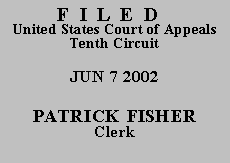 UNITED STATES COURT OF APPEALS
UNITED STATES COURT OF APPEALS
 UNITED STATES COURT OF APPEALS
UNITED STATES COURT OF APPEALS
2:98-CR-248-C)
Mr. Santos Pelayo-Rodriguez appeals the district court's refusal to vacate,
set aside, or correct his sentence pursuant to 28 U.S.C. § 2255. On May 6, 1998,
Appellant was charged by indictment with illegal re-entry of a deported alien, in
violation of 8 U.S.C. § 1326. Section 1326 allows for imprisonment of not more
than two years. However, after Appellant received a sentence enhancement
pursuant to 8 U.S.C.§ 1326(b)(2), his sentence totaled seventy months of
imprisonment. Section 1326(b)(2) allows for a punishment of "not more than 20
years" for a removed alien "whose removal was subsequent to a conviction for
commission of an aggravated felony." The indictment did not mention the
previous conviction.
In his plea agreement entered on July 22, 1998, Appellant signed a
statement in which he admitted his previous aggravated felony conviction of
possession of a controlled substance and "at least one" previous deportation. In
his § 2255 petition, Appellant claims that his sentence was unlawfully enhanced
because the prior felony was not set forth in the indictment. Appellant relies on
Apprendi v. New Jersey, 530 U.S. 466, 476 (2000), which holds that "any fact
other than prior conviction that increases the maximum penalty for a crime must
be submitted to a jury and proved beyond a reasonable doubt." (quotations
omitted).
The district court dismissed Appellant's petition, finding his claim was
foreclosed by Almendarez-Torres v. United States, 523 U.S. 224 (1998). In
Almendarez, the Supreme Court held that an indictment need not set forth factors
relevant to the sentencing of an offender and that § 1326(b)(2) is "a penalty
provision, which simply authorizes a court to increase the sentence for a
recidivist. It does not define a separate crime." Id. at 226.
This circuit determined in United States v. Prentiss, 256 F.3d 971, 981
(10th Cir. 2001), that "the failure of an indictment to allege an essential element
of a crime does not deprive a district court of subject matter jurisdiction; rather,
such failure is subject to harmless error review." (Emphasis in original). While
this appeal was pending, the Supreme Court decided United States v. Cotton, __
U.S. __; 122 S. Ct. 1781, 1785 (2002), which affirmed Prentiss and overruled
precedence "insofar as it held that a defective indictment deprives a court of
jurisdiction."
In order for this court to grant a certificate of appealability, Appellant must
make "a substantial showing of the denial of a constitutional right." 28 U.S.C. §
2253(c)(2). To do so, Appellant must demonstrate that "reasonable jurists could
debate whether (or, for that matter, agree that) the petition should have been
resolved in a different manner or that the issues presented were adequate to
deserve encouragement to proceed further." Slack v. McDaniel, 529 U.S. 473,
484 (2000) (quotations omitted).
We have carefully reviewed Appellant's brief, the district court's
disposition, and the record on appeal. Nothing in the facts, the record on appeal,
or Appellant's brief raises an issue which meets our standards for the grant of a
certificate of appealability. For substantially the same reasons as set forth by the
district court in its Order of May 10, 2001, we cannot say that "reasonable jurists
could debate whether (or, for that matter, agree that) the petition should have
been resolved in a different manner." Id. We DENY Appellant's
request for a
certificate of appealability and DISMISS the appeal.
Entered for the Court
Monroe G. McKay
Circuit Judge
*. This order and judgment is not binding
precedent, except under the
doctrines of law of the case, res judicata, and collateral estoppel. The court
generally disfavors the citation of orders and judgments; nevertheless, an order
and judgment may be cited under the terms and conditions of 10th Cir. R. 36.3.
UNITED STATES OF AMERICA,
Plaintiff - Appellee,
v.
JOSE SANTOS PELAYO-RODRIGUEZ,
Defendant - Appellant.
Before KELLY, McKAY, and
MURPHY, Circuit Judges.
After examining the briefs and the appellate record, this panel has
determined unanimously that oral argument would not materially assist the
determination of this appeal. See Fed. R. App. P. 34(a)(2); 10th Cir. R. 34.1(G).
The case is therefore ordered submitted without oral argument.
Click footnote number to return to corresponding location in the text.
![]() | Keyword |
Case |
Docket |
Date: Filed /
Added |
| Keyword |
Case |
Docket |
Date: Filed /
Added |
![]() (15386 bytes)
(15386 bytes)
![]() (10265 bytes)
(10265 bytes)
Comments to: WebMaster,
ca10 [at] washburnlaw.edu.
Updated: June 10, 2002.
HTML markup © 2002, Washburn University School of Law.
URL: http://ca10.washburnlaw.edu/cases/2002/06/01-4125.htm.